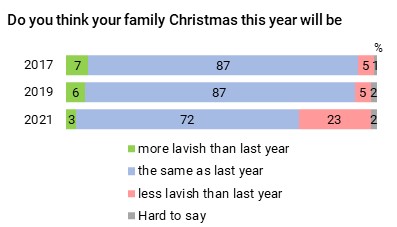43/2021
2022-01-05
A More Modest Christmas than Last Year
Every other December CBOS asks Polish people whether their family Christmas that year will be as lavish as the previous one. The results of the 2019 survey were virtually identical to those of two years earlier: a decided majority of respondents (87%) said their family Christmas would be the same as before. While this is still the dominant reply (72%), it nonetheless shows a drop of 15 percentage points. At the same time, the percentage of people anticipating a more modest Christmas has increased almost five-fold, with virtually one in four respondents giving this answer (23% as against 5% in 2019). In addition, the already small percentage expecting a more lavish Christmas has halved. These clear changes can most likely be attributed to the uncertain situation of the country’s economy.

|
These forecasts are connected in an obvious way with the financial circumstances of the people surveyed. Those describing their financial circumstances as poor were markedly more likely to be expecting a less lavish Christmas than those describing their circumstances as good (60% as against 13%), as were those where the income per household member was lower (37% where per capita income was under 1,000 zloty, as against 16% where it was over 3,000 zloty). The expectation of a more modest Christmas was also more than averagely common among those whose religious practice was less frequent (30% for those not participating in religious practice at all, as against 15% for those participating several times a week) and those with left-wing views (30% as against 14% for those favouring the right).
More on this subject in the CBOS report.
This ‘Current Events and Problems’ survey (380) was conducted using a mixed-mode procedure on a representative sample of named adult residents of Poland, randomly selected from the National Identity Number (PESEL) register.
Respondents independently selected one of the following methods:
– Computer Assisted Personal Interview (CAPI);
– Computer Assisted Telephone Interview (CATI), respondents receiving researchers’ telephone numbers in an introductory letter from CBOS;
– Computer Assisted Web Interview (CAWI), where respondents filled in the online questionnaire independently, gaining access by means of a login and password provided in an introductory letter from CBOS.
– Computer Assisted Personal Interview (CAPI);
– Computer Assisted Telephone Interview (CATI), respondents receiving researchers’ telephone numbers in an introductory letter from CBOS;
– Computer Assisted Web Interview (CAWI), where respondents filled in the online questionnaire independently, gaining access by means of a login and password provided in an introductory letter from CBOS.
In all three cases the questionnaire had the same structure and comprised the same questions. The survey was carried out between 29 November and 12 December 2021 inclusive on a sample of 1063 people (47.0% using the CAPI method, 35.7% CATI and 17.3% CAWI).
CBOS has been conducting statutory research using the above procedure since May 2020, stating in each case the percentage of personal, telephone and internet interviews.





